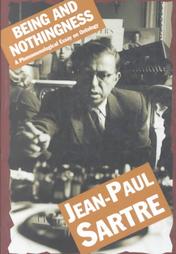

It is then that his freedom will become conscious of itself and will reveal itself in anguish as the unique source of value and the nothingness by which the world exists. “But ontology and existential psychoanalysis (or the spontaneous and empirical application which men have always made of these disciplines) must reveal to the moral agent that he is the being by whom values exist. Have a look at this, verbatim, passage below from Sartre’s conclusion: Indeed, and, occasionally, wading through the essay is like reading Professional Moron on one of our particularly ridiculous days. It’s not the type of work you delve into after a horrible day at work: “Ah, I’m back! Now time to read about personal anguish!” etc.

Philosophical meanderings aside, what is Being and Nothingness like to read? If you’re looking for a romantic comedy which will make you feel all gooey inside, this is not for you. Sartre was a genius, but reading the essay can be heavy going. The subject here is human’s experience of reality, with Sartre making a bloody strong case for the putative failure of determinism.Įssentially, in basic form (otherwise we’ll be here all day explaining this to you), this is Sartre’s argument: free will is real and each human is responsible for their actions. “Modern thought has realised considerable progress by reducing the existent to the series of appearances which manifest it.” In his introduction “The pursuit of being”, Sartre wastes no time in getting on with things: The book is playfully referred to as the bible of existential thought. It’s a work which will make the reader challenge their understanding of the world, the nature of the human condition, and you’ll learn some pretty big and impressive new words along the way.

It’s rare for a work to present such exquisitely abstract thought made vivid through examples imagined by a great novelist.”Īs such, the book is certainly one of the most important of the previous century. “A document of what life in the twentieth century was about. The essay is considered a philosophical masterpiece and rightly so-it is also:

In his essay, Sartre makes the famous claim “existence precedes essence” and he goes on to argue free will is real and humans are, essentially, responsible for their actions in the absence of a deity.


 0 kommentar(er)
0 kommentar(er)
